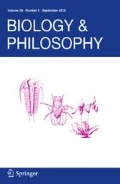Abstract
Biological and cognitive sciences rely heavily on the idea of information transmitted between natural events or processes. This paper critically assesses some current philosophical views of natural information and defends a view of natural information as Nomic and Factive. Dretske (Knowledge the flow of information/Fred Dretske, MIT Press Cambridge, Mass, 1981) offered a Factive view of information, and recent work on the topic has tended to reject this aspect of his view in favor of a non-Factive, probabilistic approach. This paper argues that the reasoning behind this move to non-Factivity is flawed and mixes up different problems with Dretske’s original view. I show that one of these problems—strictness—has to do with Nomicity rather than Factivity. The other problem—reference class ambiguity—is not solvable just in terms of a theory of natural information. On the Dretske-inspired view I defend, natural information is Factive and Nomic but is insufficient to determine the cognitive or biological content of a natural process. In sum I present an examination what natural information is and what role it can (and cannot) play in our understanding of living and thinking things.

Similar content being viewed by others
Notes
Going forward I will usually refer simply to ”information” without the ”natural” qualifier, trusting that my meaning will be clear from context.
This is one way of roughly stating ”the problem of Intentionality,” which has concerned quite a few philosophers besides Dretske (Jacob 2019).
Dretske actually uses different phrases to connote non-accidentalness in different places, and some of these are weaker-sounding than (ii). At times he speaks broadly of ”nomic dependence” (1981, pp. 75–76). He also relies considerably on an example where informational relations are fixed by conventions among regular partners in a card game (70), which seems not to involve Lawful correlations in the strong sense DT suggests. Still, Dretske does explicitly appeal to Laws at times, and I believe DT reflects how Dretske’s approach has generally been received by others in this literature.
See (Strevens 2019) on difference-making.
References
Armstrong DM (1983) What is a Law of Nature? Cambridge University Press, Cambridge
Ballinger C (2008) Initial conditions and the “open systems’’ argument against laws of nature. Metaphysica 9(1):17–31
Barwise J, Seligman J (1997) Information flow: the logic of distributed systems. cambridge tracts in theoretical computer science. Cambridge University Press, Cambridge
Beebee H, Papineau D (1997) Probability as a guide to life. J Philos 94(5):217–243
Butler, J (1895) Butler’s analogy of religion, natural and revealed to the constitution and course of nature. London: Henry Frowde
Cartwright N (1999) The dappled world: a study of the boundaries of science. Cambridge University Press, Cambridge
Chibbaro S, Vulpiani A (2017) Compressibility, laws of nature, initial conditions and complexity. Found Phys 47(10):1368–1386
Cohen J, Meskin A (2006) An objective counterfactual theory of information. Australas J Philos 84(3):333–352
Dretske F (1977) Laws of nature. Philos Sci 44(2):248–268
Dretske F (1981) Knowledge the flow of information / Fred Dretske, 1st edn. MIT Press, Cambridge
Dretske F (1986) Misrepresentation. In: Bogdan R (ed) Belief: form, content, and function. Oxford University Press, Oxford, pp 17–36
Dretske FI (1988) Explaining behavior: Reasons in a world of causes. MIT Press
Eliasmith C (2005) A new perspective on representational problems. J Cogn Sci 6:97–123
Frisch M (2004) Laws and initial conditions. Philos Sci 71(5):696–706
Garson J (2017) A generalized selected effects theory of function. Philos Sci 84(3):523–543
Godfrey-Smith P (1992) Indication and adaptation. Synthese 92(2):283–312
Grice HP (1957) Meaning. Philos Rev 66(3):377–388
Griffiths PE (1993) Functional analysis and proper functions. British J Philos Sci 44(3):409–422
Hájek A (2007) The reference class problem is your problem too. Synthese 156(3):563–585
Harman G (1983) Problems with probabilistic semantics. In: Orenstein A, Stern R (eds) Developments in Semantics. Haven, UK, pp 237–243
Jacob P (2019) Intentionality. In: Zalta Edward N (ed) The Stanford Encyclopedia of Philosophy. Metaphysics Research Lab, Stanford University, winter 2019 edition
Kraemer DM (2015) Natural probabilistic information. Synthese 192(9):2901–2919
Kugler PN, Turvey MT (1987) Information, Natural Law, and the Self-Assembly of Rhythmic Movement. Lawrence Erlbaum Associates, Inc
Lange M (1993) Natural laws and the problem of provisos. Erkenntnis 38(2):233–248
Lewis DK (1969) Convention: a philosophical study. Wiley-Blackwell, New Jersey
Millikan RG (1984) Language, thought, and other biological categories. MIT Press, Cambridge
Millikan RG (2001) What has natural information to do with intentional representation? In: Walsh D (ed) Royal institute of philosophy supplement. Cambridge University Press, Cambridge, pp 105–125
Millikan RG (2004) Varieties of meaning: the 2002 Jean Nicod lectures. MIT Press, Cambridge
Millikan RG (2017) Beyond concepts: unicepts, language, and natural information. Oxford University Press, Oxford
Neander K (1991) Functions as selected effects: The conceptual analyst’s defense. Philos Sci 58(2):168–184
Neander K (2017) A mark of the mental: a defence of informational teleosemantics. MIT Press, Cambridge, USA
Scarantino A (2015) Information as a probabilistic difference maker. Australas J Philos 93(3):419–443
Scarantino A, Piccinini G (2010) Information without truth. Metaphilosophy 41(3):313–330
Shannon CE (1948) A mathematical theory of communication. Bell Syst Tech J 27(3):379–423
Shea N (2007) Consumers need information: Supplementing teleosemantics with an input condition. Philos Phenomenol Res 75(2):404–435
Skyrms B (2010) Signals: Evolution, learning, and information. Oxford University Press, Oxford
Smith JM (2000) The concept of information in biology. Philos Sci 67(2):177–194
Strevens M (2019) Explanation, abstraction, and difference-making. Philos Phenomenol Res 99(3):726–731
van Fraassen BC (1989) Laws and symmetry. Oxford University Press, Oxford
Woodward J (2018) Laws: An invariance- based account. In: Ott, Patton (eds) Laws of Nature. Oxford University Press, Oxford
Woodward J (2020) Physical modality, laws, and counterfactuals. Synthese 197(5):1907–1929
Author information
Authors and Affiliations
Corresponding author
Additional information
Publisher's Note
Springer Nature remains neutral with regard to jurisdictional claims in published maps and institutional affiliations.
Rights and permissions
About this article
Cite this article
Baker, B. Natural information, factivity and nomicity. Biol Philos 36, 26 (2021). https://doi.org/10.1007/s10539-021-09784-4
Received:
Accepted:
Published:
DOI: https://doi.org/10.1007/s10539-021-09784-4


